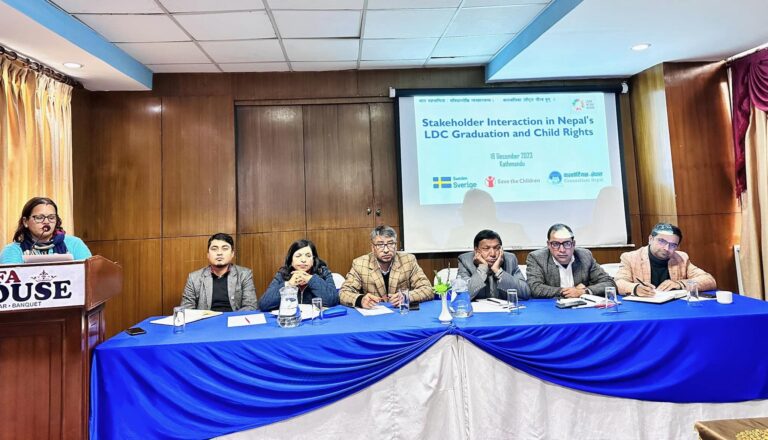Stakeholder Interaction in Nepal’s LDC Graduation and Child Rights

Nepal has been included in the least developed country category since 1971. Nepal is going to graduate from the least developed country (LDC) category in 2026. Graduation is an important milestone in Nepal for its development journey. The government of Nepal is in the process of formulating a transition strategy to ensure graduation is smooth, sustainable and irreversible. It demonstrates the country’s performance in key macroeconomic indicators and broad based social developments. Years of concerted efforts from government agencies, development partners, and civil society have propelled the country towards significant achievements in education, healthcare, and infrastructure, positioning it for global recognition. This transition carries not only newfound opportunities but also heightened responsibilities.
In this connection, on 19th of December Consortium-Nepal organized a stakeholder interaction in Nepal’s LDC graduation and child rights. This stakeholder meeting aims to bring together key representatives from government agencies, development partners, children, and civil society organizations to discuss and strategize around the opportunities and challenges associated with this transition. It aims to describe the opportunities and challenges as well as way forward while graduating from Lower Develop Country (LDC).
Guest from National Child Rights Councils Bam Bahadur Baniya, NGO federation Arjun Bhattarai, Ministry of women children and senior citizen Kamala Dahal, and NACG Kiran Thapa, Key note speaker Dilli Raj Neupane (Phd), Child right activist Milan Dharel were on the dash as a guest. Different networks leaders, partner organization, advisors, development partners and member from national child advocates council make their active presentation during the program. The presentation was facilitating by Milan Dharel regarding to the Nepal’s LDC graduation & children’s concern. He discussed about the LDC with the lens of Child Rights. He makes clear about the LDC. In the presentation he described that either or not the planning process of LDC graduation touch children’s sectors or not. He described about the key criteria of LDC which aims to provide clear information about what kind of criteria makes country to list in LDC. Similarly, in presentation he postulates about the favor to LDC, where he discussed about the trade related international support measures, preferential market access for goods, aid for trade, scholarship ,education and research support, trade related technical assistance and capacity building as well as the multilateral cooperation in development process. Following the presentation he discussed about the importance of graduation as well. It is important to graduate from LDC to develop country to reduce country from economic crises, to lead country to transition, to increase opportunities and credibility. Moreover, presentation discussed about the actual children concerns with regards to LDC graduation. It makes a sense to know about the either or not children are touch in the planning of LDC graduation. Participants present their view regarding to the LDC graduation and child rights during the open discussion of program. Further Key note Speaker stated about the concerns related to the LDC and child rights. He described about the criteria of categorization in LDC. Following this guest from NCRC, MoWCS, NACG chairperson kept their remarks relevant to the topic.
The interaction was very insightful with stakeholders. It is important to discuss more on LDC graduation and child rights. Further, different planning meeting as well as interactive dialogues should be organized on LDC graduation focusing child and their rights.